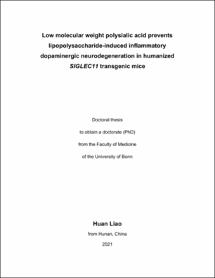Low molecular weight polysialic acid prevents lipopolysaccharide-induced inflammatory dopaminergic neurodegeneration in humanized SIGLEC11 transgenic mice

Low molecular weight polysialic acid prevents lipopolysaccharide-induced inflammatory dopaminergic neurodegeneration in humanized SIGLEC11 transgenic mice

| dc.contributor.advisor | Neumann, Harald | |
| dc.contributor.author | Liao, Huan | |
| dc.date.accessioned | 2021-07-13T11:25:47Z | |
| dc.date.available | 2022-07-15T22:00:22Z | |
| dc.date.issued | 13.07.2021 | |
| dc.identifier.uri | https://hdl.handle.net/20.500.11811/9216 | |
| dc.description.abstract | Parkinson’s disease is one of the most common neurodegenerative diseases in the elderly population, with a pathophysiology linked to neuroinflammation, complement activation and oxidative damage. Soluble polysialic acid with an average degree of polymerization 20 (polySia avDP20) prevents inflammation and oxidative burst in human macrophages via sialic acid-binding immunoglobulin like lectin-11 (SIGLEC11) receptor and interferes with alternative complement activation. Here, we confirmed the anti-inflammatory capacity of polySia avDP20 on cultured embryonic stem cell-derived microglia (ESdM) and analyzed the effect of polySia avDP20 in a lipopolysaccharide (LPS)- triggered animal model of PD. In vitro, 5 µM and 15 µM polySia avDP20 attenuated the tumor necrosis factor-α (Tnf–α) mRNA gene transcription of LPS treated ESdM. We also demonstrated a neuroprotective effect of polySia avDP20 in LPS-challenged humanized SIGLEC11 transgenic mice. In vivo, intraperitoneal application of 10µg/g body weight polySia avDP20 attenuated the LPS-triggered increase in mRNA levels of immune-related genes (Il-1β, Cd14, Myd88, Fcer1g, Itgam, C4, Cybb, Iba1 and Cd68) and cell death-related genes (Casp8, Ripk1 and Ripk3) in the brains after repeated systemic LPS challenge in SIGLEC11 transgenic mice on day 19, but not on day 5. Moreover, immunohistochemistry demonstrated that polySia avDP20 inhibited the LPS-induced increase in immunoreactivity of IBA1 and CD68 in the substantia nigra pars reticulata in SIGLEC11 transgenic and wild type mice on day 19. Furthermore, treatment with polySia avDP20 restored the loss of dopaminergic neurons in the substantia nigra pars compacta induced by LPS challenge in, both, SIGLEC11 transgenic and wild type mice on day 19. Thus, data demonstrates that polySia avDP20 ameliorates inflammatory dopaminergic neurodegeneration in SIGLEC11 transgenic and partially in wild type mice and thus is a promising drug candidate to prevent PD-related inflammation and neurodegeneration. | en |
| dc.language.iso | eng | |
| dc.rights | In Copyright | |
| dc.rights.uri | http://rightsstatements.org/vocab/InC/1.0/ | |
| dc.subject | Polysialinsäure | |
| dc.subject | Mikroglia | |
| dc.subject | SIGLEC11 | |
| dc.subject | Neuroinflammation | |
| dc.subject | Parkinson-Krankheit | |
| dc.subject | polysialic acid | |
| dc.subject | microglia | |
| dc.subject | neuroinflammation | |
| dc.subject | Parkinson’s disease | |
| dc.subject.ddc | 570 Biowissenschaften, Biologie | |
| dc.subject.ddc | 610 Medizin, Gesundheit | |
| dc.subject.ddc | 615 Pharmakologie, Therapeutik | |
| dc.title | Low molecular weight polysialic acid prevents lipopolysaccharide-induced inflammatory dopaminergic neurodegeneration in humanized SIGLEC11 transgenic mice | |
| dc.type | Dissertation oder Habilitation | |
| dc.publisher.name | Universitäts- und Landesbibliothek Bonn | |
| dc.publisher.location | Bonn | |
| dc.rights.accessRights | openAccess | |
| dc.identifier.urn | https://nbn-resolving.org/urn:nbn:de:hbz:5-63091 | |
| ulbbn.pubtype | Erstveröffentlichung | |
| ulbbnediss.affiliation.name | Rheinische Friedrich-Wilhelms-Universität Bonn | |
| ulbbnediss.affiliation.location | Bonn | |
| ulbbnediss.thesis.level | Dissertation | |
| ulbbnediss.dissID | 6309 | |
| ulbbnediss.date.accepted | 05.07.2021 | |
| ulbbnediss.institute | Medizinische Fakultät / Institute : Institut für Rekonstruktive Neurobiologie (IRN) | |
| ulbbnediss.fakultaet | Medizinische Fakultät | |
| dc.contributor.coReferee | Langmann, Thomas | |
| ulbbnediss.contributor.orcid | https://orcid.org/0000-0003-3696-7005 | |
| ulbbnediss.date.embargoEndDate | 15.07.2022 | |
| ulbbnediss.contributor.gnd | 1245426095 |
Dateien zu dieser Ressource
Das Dokument erscheint in:
-
E-Dissertationen (1939)




